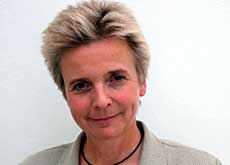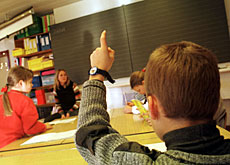English dominance leaves academic cold

The new president of the Swiss Academy of Social Sciences has criticised moves to give English priority in schools over a second national language.
In an interview with swissinfo, Anne-Claude Berthoud praises the co-existence of German, French and Italian in Switzerland as a model for the European Union.
In June Berthoud became president of the Swiss Academy of Social Sciences, which groups about 50 scientific organisations and focuses on promoting research.
She is a professor at Lausanne University in the French-speaking part of Switzerland and vice-president of the European Language Council, an association aimed at improving the knowledge of the languages and cultures of the EU and beyond.
A renowned linguist, her appointment comes at a time of growing controversy over the increased prominence given to English in the country’s schools.
Earlier this year, the cantonal education directors decided that all primary schools must teach at least two foreign languages – including English – from 2012.
Most German-speaking cantons have said they will start teaching English before the national language, French.
swissinfo: Several cantonal authorities in Switzerland decided to give preference to English over a second national language at school. What do you make of that?
Anne-Claude Berthoud: I deeply deplore this. Because it could have an adverse effect on pupils when they have to learn a second national language.
At a European level we advocate the teaching of two foreign languages besides the mother tongue. One – English – serves as lingua franca while the other is a local language. For us, the latter is more important. It’s a fact that English is picked up anyway.
Children are first of all taught what they need for their professional careers. I’m not sure that they are motivated to learn a second foreign language when they start off with English.
swissinfo: Others argue that foreign languages in general stand to benefit from the popularity of English.
A-C.B.: In theory, they have a point. Nevertheless, in my opinion, the main purpose of learning a first foreign language has to be dialogue.
Is it not essential to be able to talk first of all to somebody who lives just a few kilometres or more away, before we learn to communicate with the world?
swissinfo: Switzerland’s French-speaking minority often complains about the use of Swiss-German dialects in the media. Is it really fair to the majority Swiss-German speakers to ask them to use standard German, which is not really their mother tongue?
A-C.B.: I think it is important to maintain the use of Swiss-German dialects; it is part of our cultural identity. But it is crucial to be able to communicate with someone from outside your language community. If you can’t do this, you lock others out.
Native Swiss-German speakers have to learn other languages quickly, as hard as this may sound. There’re no two ways about it: those who don’t master standard German will soon find themselves at a disadvantage.
swissinfo: Would you describe yourself as a true product of Switzerland’s tradition of multilingualism?
A-C.B.: I have been able to benefit from it. I work as a linguist in a country with several languages, and since I know German [Berthoud’s mother tongue is French] I enjoy the advantages of being bilingual in Switzerland.
I think we have to consider multilingualism as an opportunity. Switzerland could serve as a testing ground for the expanding European Union which will have to defend its cultural diversity.
I can say from personal experience in Switzerland and as a member of the European Language Council that the Swiss way – where everybody speaks their own language and is understood – could serve as a model in Brussels.
swissinfo: You have recently taken up the post of president of the Swiss Academy of Social Sciences. What are your aims?
A-C.B.: One of our main targets for the next few years is to increase cooperation between the various disciplines of social sciences. We also have to put an end to the strict boundaries between social and natural sciences.
I think we have to find new forms of dialogue such as interdisciplinary research, for instance on stem cells and cloning. It could be very rewarding for linguists to be involved in such major debates from the beginning.
swissinfo: How do you see things developing in the future?
A-C. B.: The 21st century has to be humanist and multilingual at the same time. Uniqueness has to have a place in diversity. We have to learn to combine the feeling of belonging to a certain place and to be open to the world.
I believe that social sciences should do all it can to make sure that the 21st century goes down in history as a humanist era.
swissinfo-interview: Isabelle Eichenberger
Anne-Claude Berthoud is a professor at the Institute of Linguistics at Lausanne University.
She succeeded Roland Ris as president of the Swiss Academy of Social Sciences in June.
The Swiss Academy of Social Sciences is an umbrella organisation for 50 scientific groups.
They represent a wide range of subjects including literature, theology, communications or anthropology and about 45,000 scientists.
The Academy, which was founded in 1946 and is supported by the federal authorities, aims to promote research.

In compliance with the JTI standards
More: SWI swissinfo.ch certified by the Journalism Trust Initiative



You can find an overview of ongoing debates with our journalists here. Please join us!
If you want to start a conversation about a topic raised in this article or want to report factual errors, email us at english@swissinfo.ch.